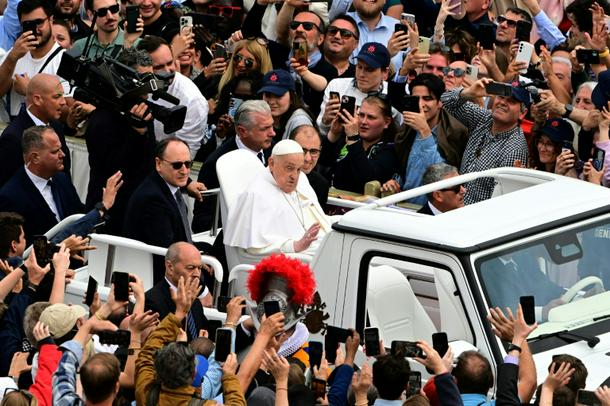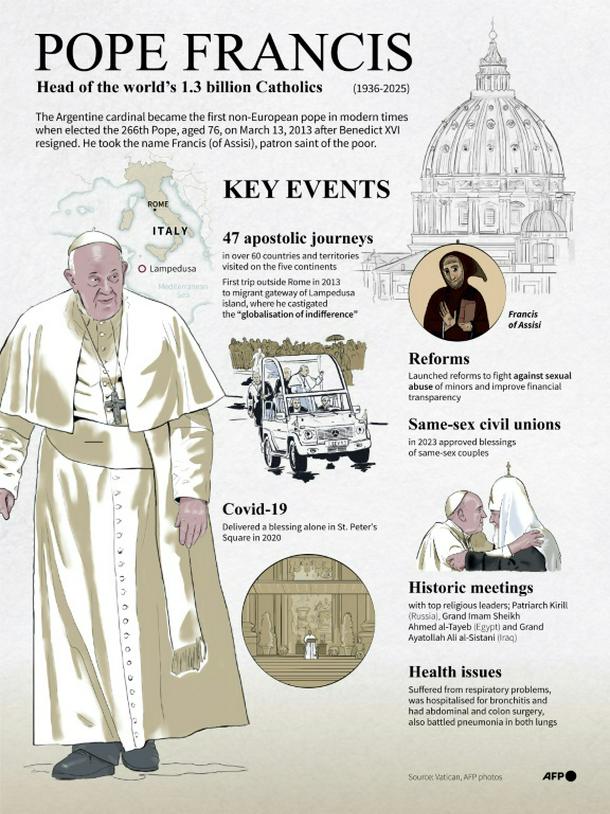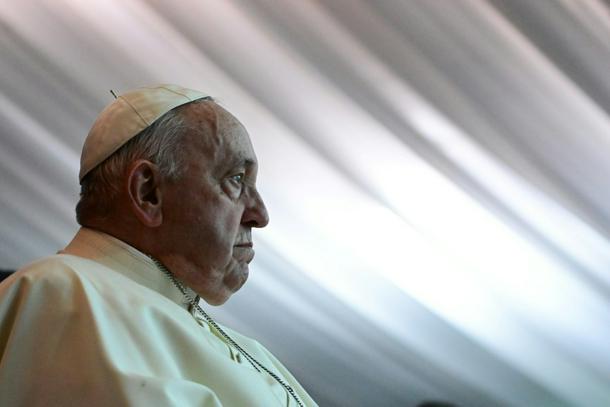
On Sunday, Pope Francis greeted the crowd in St Peter's Square after Easter mass
Vatican City (AFP) - Pope Francis, an energetic reformer who inspired widespread devotion from Catholics but riled traditionalists, died on Monday aged 88, just a day after greeting delighted worshippers after Easter Mass.
The death of the Argentine pontiff, leader of the Catholic Church since March 2013, came less than a month after having been released from hospital following a 38-day battle with double pneumonia.
Some visitors to St Peters Square – where a frail-looking Francis was cheered by Easter Sunday worshippers during an unscheduled appearance just a day earlier – were left in tears at the news.
World leaders paid tribute to his moral and spiritual leadership and countries began preparations to mark his death.
“Dearest brothers and sisters, it is with deep sorrow that I must announce the death of our Holy Father Francis,” said Cardinal Kevin Farrell in the statement published by the Vatican on its Telegram channel.

Key events in the papacy of Pope Francis
“This morning at 7:35 am (0535 GMT) the Bishop of Rome, Francis, returned to the home of the Father.
“His entire life was dedicated to the service of the Lord and His church,” said the statement, released shortly before 10:00 am.
His death sets in motion centuries-old traditions that will culminate in the gathering of a conclave of cardinals to choose a successor.
In the next four to six days the Vatican’s cardinals will decide on the pope’s funeral date, at which point his coffin will be transferred to St Peter’s Basilica.
In the meantime, the day-to-day running of the tiny Vatican City state will be handled by the Camerlengo, a senior cardinal, currently Dublin-born Cardinal Farrell.
Francis’s body will be laid in its coffin in the chapel at the Saint Martha residence where he lived at 8:00 pm, the Vatican said, while the Rosary prayer will be held “in the middle of the day”.
- ‘Spiritual father’ -
At the Vatican on Monday, a hush seemed to descend on the normally boisterous Saint Peter’s Square as the death knell rang out.
“He lived this Easter and then he went,” Cesarina Cireddu from Sardinia said with tears in her eyes. “He’s actually returned to the Lord – and godspeed.”
Tour groups continued to walk through the sprawling plaza as quiet groups of people leaned against a barricade to pray.

Pope Francis's death came just a day after he delighted the crowds at the Vatican on Easter Sunday with an unscheduled appearance
Venezuelan Riccardo Vielma, 31, who is studying to be a priest, said “we have lost our spiritual father”.
Francis, whose real name was Jorge Bergoglio, was the first Jesuit to lead the world’s almost 1.4 billion Catholics and the first from the Americas.
He took over after Benedict XVI became the first pontiff since the Middle Ages to step down – and cut a sharply different figure from the German theologian.
A football-loving former archbishop of Buenos Aires who was often happiest among his flock, Francis sought to forge a more open and compassionate Church.
- Served ‘with devotion’ -
World leaders praised him for having strongly defended social justice and the rights of migrants.
Britain’s King Charles, who met Francis during a state visit earlier this month, said the pope had “served with such devotion”.
Italy’s Prime Minister Giorgia Meloni said “a great man has left us” in a statement, while Argentina’s President Javier Milei pointed to his compatriot’s “goodness and wisdom” despite their “differences”.
European Commission President Ursula von der Leyen said Francis had “inspired millions… with his humility and love so pure for the less fortunate”.
US Vice President JD Vance, a Catholic convert who briefly met Francis on Sunday while on a trip to Rome with his family, said his “heart goes out” to Christians. The White House wrote “Rest in Peace” on X.
Ukrainian President Volodymyr Zelensky said he was grieving and Russian President Vladimir Putin praised the pope’s promotion of dialogue between the Orthodox and Catholic churches.
Italy’s Serie A football league called off all the day’s matches and the country’s Olympic committee called for all sporting events due to take place there on Monday to be postponed.
Spain announced three days of mourning while the bells at the Notre Dame cathedral in Paris rang out 88 times and the city said the lights would be turned off at the Eiffel Tower on Monday evening.
- Reforming pope -
Francis’s pontificate was also marked by pushing through governance reforms and tackling the scourge of clerical sex abuse of children.
But critics accused him of creating doctrinal confusion and failing to defend traditional Catholic beliefs on key issues such as abortion and divorce.
Francis’s desire to chart a different path was evident right to the end, with his decision to be buried not in St Peter’s Basilica but in Rome’s Santa Maria Maggiore basilica.
He will become the first pope in more than 100 years to be laid to rest outside the Vatican.
Francis also rejected the tradition of popes having three coffins, instead choosing to be buried in just one.
- Health issues -
Francis, who had part of his lung removed as a young man, had maintained a busy schedule before his latest hospital admission, even hosting the prime minister of Slovakia shortly beforehand.
Even after he was released from hospital and ordered to rest for two months, Francis, known for being stubborn, did not wait long before making public appearances, meeting Britain’s King Charles and visiting a prison.
But he was barely able to speak and delegated the traditional Easter Sunday “Urbi et Orbi” (“To the City and the World”) benediction to an associate, although he later toured Saint Peter’s Square in his popemobile, greeting worshippers.
Despite a growing number of health problems, he never took a day off and made frequent trips abroad, including a four-nation Asia-Pacific tour only last September.
Huge crowds gathered wherever he went, a testament to his popularity and human touch.
- ‘Who am I to judge?’ -
When Francis took over, the Catholic Church was mired in infighting and beset by a global scandal over clerical sex abuse of children and decades of cover-ups.
He promised an end to impunity and changed Vatican law to help tackle abuse, though victims said he could have gone further.
More widely, he initiated a major shake-up of the Vatican’s powerful governing body, including improving financial responsibility and allowing lay Catholics to lead Vatican offices.
Throughout his papacy, Francis championed the poor and vulnerable and emphasised love over doctrine.
“If someone is gay and is searching for the Lord and has good will, then who am I to judge him?” he said at the start of his papacy.
However, his detractors accused him of failing to uphold established Church doctrine.